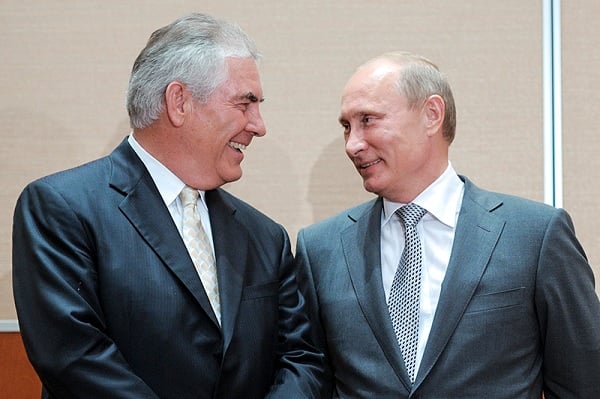
ExxonMobil CEO Rex Tillerson meets with Russian President Vladimir Putin, 2011 (RBC)
As CNN reports, U.S. “companies from the oil, energy, banking, aerospace, auto and heavy manufacturing industries” have been lobbying against the new Russia sanctions legislation currently making its way through Congress, arguing that it could harm their business interests. Since the Trump administration’s efforts at weakening the bill appear to have failed, Russia is now pinning its hopes on opposition from U.S. corporations and from the European Union to avoid tightened U.S. sanctions.
In addition to new sanctions aimed at punishing Russia for its interference in the 2016 U.S. presidential election, human rights violations, and aggression toward Russia’s neighbors, the bill limits the president’s ability to ease sanctions without congressional approval. This sets up a tough choice for Trump: Sign the bill and accept limitations on his authority to control U.S. policy regarding Russia, or veto it and risk accusations that he is doing the Kremlin’s bidding. The “Trump-proof” sanctions bill has strong bipartisan support in both the Senate and the House of Representatives, and a Trump veto would further risk a humiliating override vote in Congress.
Russia views the bill “extremely negatively,” and Russian media have been quick to grasp at U.S. corporate opposition to tightened sanctions. For international audiences, corporate opposition to the bill has been reported in English at Pravda, Sputnik, and RT, emphasizing its potential harm to U.S. and international business interests. As these reports note, U.S. corporations opposing or seeking changes in the bill include ExxonMobil, General Electric, Boeing, Ford, Dow Chemical, Citigroup, Visa, and MasterCard.
ExxonMobil, incidentally, was recently fined $2 million by the U.S. Treasury Department for violating sanctions on Russia while current U.S. Secretary of State Rex Tillerson was the company’s CEO. While at ExxonMobil Tillerson met with Russian President Vladimir Putin numerous times following their first meeting in 1999, and condemned U.S. sanctions on Russia following Russia’s attack on Ukraine and annexation of Crimea in 2014. Tillerson’s former role at ExxonMobil and his relationship with Russia have raised conflict of interest concerns regarding his current role as Secretary of State. Tillerson has been vocal in his criticism of the current sanctions bill.
Reports in English from Russian media also note European Union concerns and warnings that “unintended consequences” may result from “unilateral tightening of Russia sanctions.” German Chancellor Angela Merkel is quoted calling the sanctions “a peculiar move” by the United States. Concerned particularly that tightened sanctions on Russia might impact Europe’s energy sector, the EU has indeed expressed alarm at the bill, urging the United States to coordinate sanctions with its European partners. EU opposition to tightened U.S. sanctions on Russia comes despite evident Russian interference in European as well as U.S. elections.
U.S. corporate opposition to tightened sanctions on Russia has also been widely reported in Russian-language media for domestic audiences. American industrialists are “tired of the persecution of Russia,” says Pravda TV, “and demand that their own business interests be protected.” Pravda TV also notes EU corporate opposition to tightened U.S. sanctions on Russia: “The presence of these restrictions for most business people on both sides of the Atlantic Ocean is a major headache. Business seeks to resolve this issue and return to traditional business relations.”
Russia’s interference in the 2016 U.S. election and suspicions regarding possible collusion between Russia and the Trump campaign have put considerable pressure on Congress and the White House to take strong measures against Russia. Both in Russia and in American and European corporate circles, however, the hope seems to be that multinational business interests will prevail over the interests of American democracy and national security.